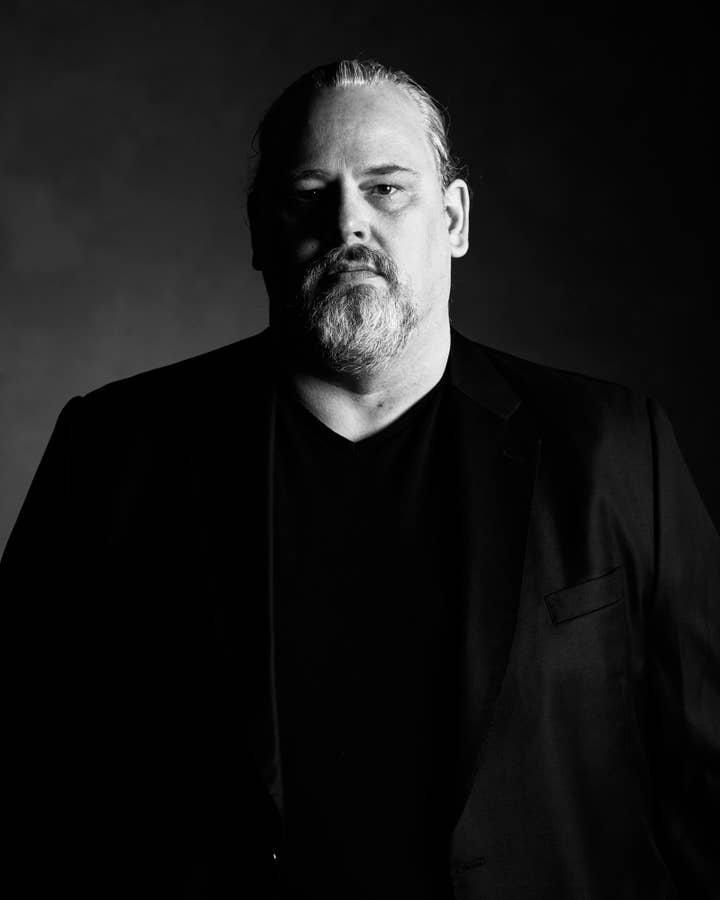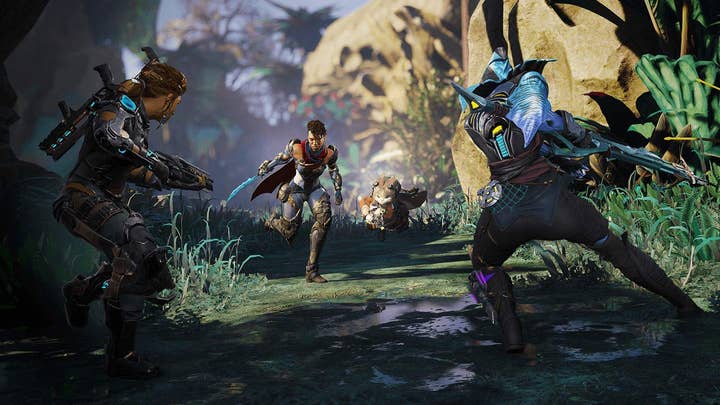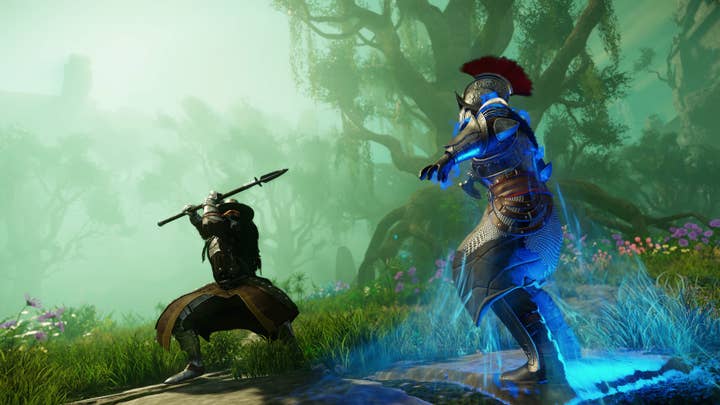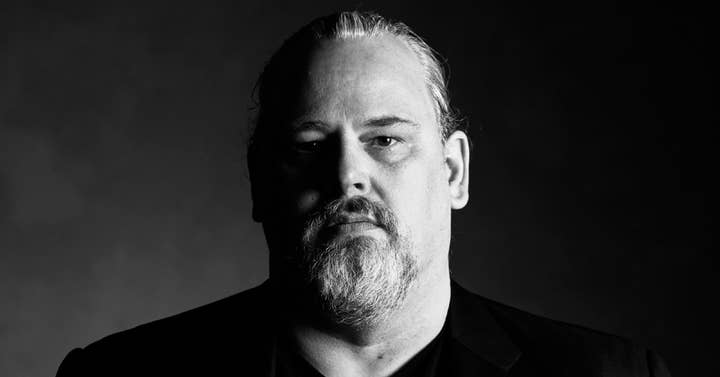Amazon Games' Christoph Hartmann: "Eventually, we'll be judged by our successes"
The 2K founder on lessons learned from Crucible, hopes for New World and why big tech firms struggle to get into games
Amazon may have fared well in almost every sector it is involved in, but it's safe to say its venture into the video games industry has been considerably less successful.
Originally focused on mobile and Facebook games, Amazon Game Studios announced way back in 2014 that it would create titles for traditional PC and console platforms. The first three games were officially announced at TwitchCon in September 2016, all built around multiplayer: Breakaway, Crucible and New World.
The first two did not fare well. Breakaway was never given a release date, had a few alpha playtests, but was cancelled in 2018. Crucible launched in May 2020, but was almost immediately taken back into beta, and was scrapped by the end of the year. Others have been cancelled along the way, including a Lord of the Rings MMO.
A racing game based on Amazon Prime Video series The Grand Tour was brought to consoles in 2019, but given New World's inclusion in the original line-up, it's hard not to see the MMO as Amazon's last chance to prove it can launch and sustain a major release. Fortunately, the company has cause to be somewhat optimistic.
The closed beta for New World earlier this year attracted more than one million players over the course of two weeks, with 25 million hours played and over 33 million hours watched on Twitch. More recently, an open beta this month attracted over 900,000 players from 192 countries -- over 600,000 of which were new to the game -- during a four-day weekend.

For Amazon Games vice president Christoph Hartmann, the lesson from the collapse of Crucible is clear.
"Only ship when you're ready," he tells GamesIndustry.biz. "For me, that's probably something we should have known better -- you don't [rush into] a territory where you already have clear market leaders. We launched Crucible at a time when PUBG and Fortnite were super, super big. It was not the right decision to go into a market segment that has such big players everyone's always chasing. It's like trying to beat Call of Duty at its peak, or trying to do another Grand Theft Auto.
"That's why we had so many delays on New World, we really wanted to make sure that this time we get it right. We have the advantage that we're not held hostage by quarters or fiscal years like traditional games developers are. So let's do the right thing for the player, not rush it out because, 'we have to hit October, and if I don't I have to hit March.' Yes, we have to build a business but we know that sometimes a month or two makes all the difference for a game. That's what really matters because we're making multiplayer service games and they have to be in the marketplace for ten years, so rushing something doesn't make sense."
Hartmann -- perhaps best known to GamesIndustry.biz readers as the founder of Take-Two's 2K Games label -- took over Amazon's games efforts in 2018, after the cancellation of Breakaway. While the division itself dates back to 2011, when Amazon sought mobile developers to create content for its own app store on Kindle, he describes its current iteration as "a very young organisation," still looking to fill some positions behind the scenes.
"Putting out a game this technical is our first hurdle," he says. "Overall, there's a lot for us to learn [from Crucible]. It wasn't great, it would have been nice to start with a big bang, but I think if we had started with a big bang, bad times would have come afterwards because you feel you have the Midas touch when everything is right."
"We launched Crucible when PUBG and Fortnite were super big. It was not the right decision to go into a market segment that has such big players everyone's always chasing"
New World launches on September 28. But for all the promising statistics from its betas, it's understandable for many to be watching the upcoming release with a mix of caution and skepticism. For all the might that Amazon wields, it has yet to launch a big hit in almost a decade. Hartmann is keen to put that timespan into perspective.
"Let's start with a little bit of maths: it takes three to four years to make a game," he says. "Today, three years is optimistic -- many games take four to five years. New World isn't the sort of game that is done in three years.
"Amazon has built its studios from scratch -- overall, we prefer to do things in-house rather than just acquire things. So let's say you need four years for a game's development. You also have to build a team and that can take two years, so already it's six years. And then if you're going to try and climb Mount Everest on the first try, you might not make it to the top -- you go to base camp one, base camp two, until you're ready to climb all the way up. So you have to add time for that."
New World is Hartmann's Everest. He sees the game as the company's tentpole title, something that will "show what Amazon games is capable of." And combined with the high hopes for Lost Ark, and a newly announced publishing deal with Glowmade -- the UK start-up formed by Lionhead and Media Molecule veterans -- he believes the company can put the stumbles of Breakaway and Crucible behind it.
"Eventually, we'll get judged by our successes," he says. "I really strongly believe in -- and this is similar to the way I built 2K -- the holy grail is to have owned IP, internal studios, and you don't ship things until they're really ready. Some of the titles I worked on, like BioShock or Borderlands, the love you put into it and the pride you put in to get the titles as right as you can... It's the same here at Amazon with our internal studios."

Those internal studios are expanding. Back in March, the company opened a new branch in Montreal, staffed by many of the creative team behind Rainbow Six Siege. Earlier this month, Amazon hired Ubisoft's Alexandre Parizeau to lead this studio -- an example of the AAA talent the company is targeting.
Yet even this news brings to mind prior stumbles. Years ago, Amazon Game Studios employed Portal designer Kim Swift and Splinter Cell director Clint Hocking. Both left before their projects came to fruition. Even former Xbox Live boss Marc Whitten left Amazon earlier this year, taking on a new role at Unity. Again, Hartmann is unfazed by the pitfalls of the past.
"We have the advantage that we're not held hostage by quarters or fiscal years like traditional games developers are. So let's do the right thing for the player, not rush it out"
"There's a big difference between the Amazon Games of seven years ago and Amazon Games now," he says. "There's a lot of potential success on the horizon. I came in three years ago with the background of having built a label for 2K before. When we interview people, I share my vision for it and they can see where we want to go. I think we're doing a good job and people like to work with us.
"One thing people really buy into here is our long-term thinking, because the games industry is known for either rushing things out of the door or giving up too early. Telling people they're going to get the time to focus on something, and if we get it right we're going to double down, is something that resonates with a lot of folks."
He adds that Lost Ark and the new Glowmade deal show that Amazon is no longer reliant on only internally made products. The aim is to create big tentpole titles in-house, but in between those, release selected titles from indie studios that fit with Amazon's strategy.
"I'd rather we do fewer titles and do them right rather than do too many," says Hartmann. "We're taking a lot of smaller bets and taking risks on them, and then doing our big ones and working on them until the piece of art is right. That's what we want to be known for going forwards."
Hartmann insists that Amazon's lack of a proven track record in the games space has in no way impacted its ability to attract potential games to sign -- after all, it's one of the biggest brands in the world. That, he says, means Amazon "always has a seat at the table when there are conversations about potential opportunities."
The question on everyone's lips is how many failures can Amazon Games endure. Reports earlier this year suggested the internet giant is pouring $500 million per year into its games division. Naturally, Hartmann does not comment on whether this figure is accurate, but surely there is a limit to how much a business can invest on one division before it expects to see results?
"Industry friends ask me the same thing," Hartmann says. "When you look at Amazon's history, if they believe in something, they really go for it in the long-term, they don't give up. I personally always believe in underpromising and overdelivering, rather than going out, making huge announcements that set the bar high and not achieving that.
"I think New World is coming out of left field for many people because I think they wrote it off, I think they thought it was never going to happen. I see a lot of enthusiasm for games within the company, a lot of support -- and that's increasing, rather than people getting fed up with it. There's many businesses that weren't a home run from the beginning and just kept going and going for it. I have no indication that the company is getting tired of its gaming division, I just see support left and right. And once we deliver a big hit, which I think New World will be, we'll just get even more support because we've proven ourselves."

That support is now ultimately decided by new CEO Andy Jassy, who took over from Jeff Bezos during the summer. Around the time, Jassy reiterated his belief in the games division, claiming Amazon can find success in the industry "if we hang in there."
Hartmann tells us Jassy has "always been extremely supportive of us," adding that the games team reported into Jassy back when it was part of Amazon Web Services, before it was later grouped with the video and music divisions.
"I think New World is coming out of left field for many people because I think they wrote it off, I think they thought it was never going to happen"
"For us, it's the best scenario: the person who was really supportive of us for all those years becoming CEO," says Hartmann. "And Jeff was super supportive of us as well, he always saw games as a strategic pillar in the long run for Amazon."
With games now sitting alongside music and video within the company structure, it brings to mind a potential opportunity. Amazon has been investing heavily in original properties for its Prime Video service; if there's room for a game based on The Grand Tour, perhaps more can be adapted and bring over their audience.
"I'm arrogant enough to believe it's not just about finding [those] opportunities -- I think the games division can also help the rest of the entertainment businesses," says Hartmann. "Why not have a game turned into a TV show or a movie? That's happening left and right at the moment, so it can go both ways. And yes, sure, if the right IP is there that makes sense as a game and we also have the right developer who can make that game, obviously we're going to do it but a lot of things have to come together. We're not in the year 2000 where you just have to do a SpongeBob game and then someone will pick it up -- those days are gone."
Amazon's library of IP is soon to expand as it continues its takeover of MGM. We recently spoke to the movie studio about its plans to bring more of its properties into video games -- well-known franchises such as James Bond, Legally Blonde, Pink Panther, Stargate and Robocop -- so what's to stop Amazon, say, making all future Bond games internally developed and exclusive to Luna, its cloud gaming service? Hartmann says such a possibility can't be discussed until the acquisition is complete.
"Obviously if we had the rights to do a game based on one of those amazing IPs, I would bend over backwards to do it," he adds.
Amazon is not alone in its struggles. Other internet giants have invited incredulity as -- despite the resources, the finance and the success seen in other sectors -- they've failed to establish a foothold in the video games sector. Google is perhaps the poster child for this, especially with the troubles it has had getting cloud gaming service Stadia off the ground. Like Amazon, it once had AAA talent behind it, a host of success stories from other sectors to boost confidence, and the resources to give it a better chance than anyone to achieve its goals. Yet with the closure of its development studios earlier this year, the potential will remain as unrealised as that of Breakaway or Crucible.
"You can do all the market research you want, but you won't know whether you have a good game until you put it in someone's hands, sometimes until it hits the marketplace"
This, then, is the multi-million dollar question behind the growing expectations around New World: Why do big tech firms struggle to get into games?
"Size does not necessarily give you quality," says Hartmann. "You need experience, the culture and know-how to have things ready when they're needed, and that's something you can't buy. It doesn't matter if you're big or small going into it, it's about betting on the right people and giving them the breathing space so they can do what they do.
"When big players want to get into the gaming space, they have to accept it takes a certain amount of time, that for a long time things can be very unpredictable. You can do all the market research you want, but you're not going to know whether you have a good game until you put it in someone's hands. Sometimes you don't even know what you've got until it hits the marketplace.
"So many people get out too early because they get nervous about it. Because the toolset they have to judge success, which is driven by numbers, is just not there. You get it once you go to scale, but you go to scale when the game is almost done. Until then, you live in a world of doubts or dreams. That's the struggle for any big company that wants to get into games"
Hartmann draws from his own background for a prime example. He once worked at BMG Interactive, the games publishing arm of a record label and the company that brought the original Grand Theft Auto to the market. The publishing rights were later sold to Take-Two as BMG decided to double down on music, its specialist market.
"Imagine what could have been if they'd held onto it for another five years," says Hartmann.
"Sometimes you've just got to stick with it and believe. That's why I think Amazon has such a good shot at becoming a big player in the space. From all the other businesses I've seen, they don't tend to give up. It's almost as if when something doesn't work, they get really angry and double motivated to get it right."









